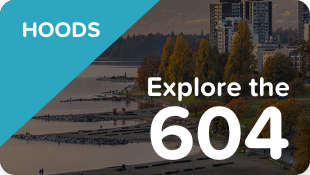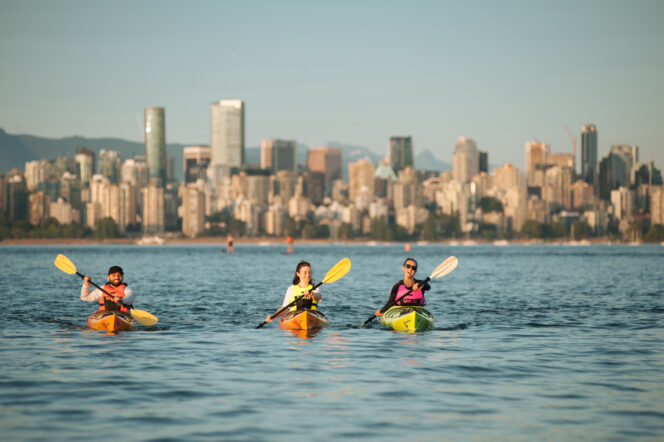
Photo: Jericho Beach Kayak Centre
On March 23, 2024, from 8:30pm to 9:30pm, people around the world are encouraged to go “lights off” and spend 60 minutes contemplating and committing to action to further the well-being of the planet. Earth Hour resonates with Vancouver, a city known for its commitment to sustainability and green living.
Earth Hour is an invitation to explore ways that you can raise your awareness about environmental issues as well as the vital interdependent relationships between people and the natural world. And there’s no better place to learn about and find joy in eco-activities than in Vancouver.
Vancouver: A Leader in Sustainability
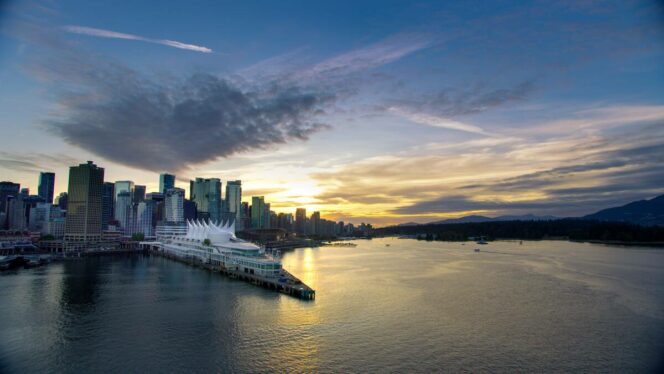
Aerial views of city and downtown at dusk, early evening; Destination Vancouver/Barbershop Films
Vancouver has long been a champion of sustainability and continues to work towards ambitious goals to combat climate change. The Economist Intelligence Unit consistently ranks Vancouver as one of the greenest cities in the world, with 1 in 15 residents employed in the green economy. Known as Green Vancouver, the city has a range of environment initiatives, including a Climate Emergency Action Plan that aims to halve carbon pollution by 2030, a Climate Change Adaptation Strategy, and a Green Operations Plan. Vancouver is committed to Zero Waste by 2040 and also has the Vancouver Plan, a road map for land use that prioritizes sustainability and the restoration of ecosystems. It’s also actively working to expand the urban forest canopy with campaigns like Branch Out, in which they give away trees for residents to plant on their own properties.
Sustainability guides decisions in the city, ranging from a plan for all new buildings to be zero emission by 2030 to ongoing work on neighbourhood energy systems, like the False Creek Neighbourhood Energy Utility (NEU).
In terms of transportation, Vancouver has a goal for 2030 of 2/3 of trips in the city being via transit or active transportation, and half of the kilometres driven being by zero emissions transport. The city has an extensive public transit system, Translink, which has its own Sustainability Policy and Climate Action Plan, and encompasses buses, the SkyTrain (rapid transit lines), the SeaBus (downtown to North Vancouver), and the West Coast Express (commuter rail service). Other more eco-ways of getting around the city include Mobi bike sharing as well car sharing, like Evo.
Places for Learning about Sustainability in Vancouver
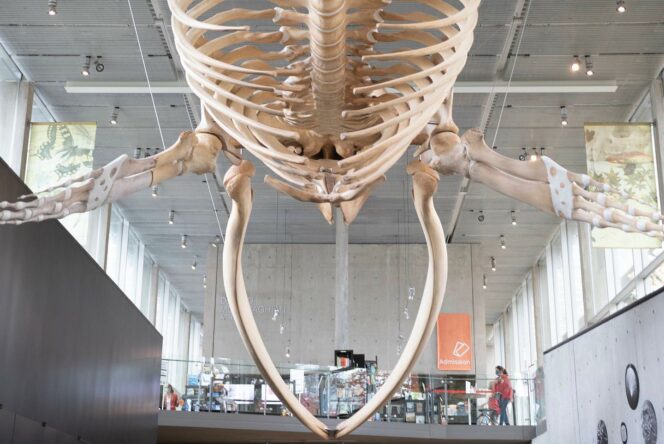
Photo: Beaty Biodiversity Museum
Many of the key attractions in the city are devoted to educating visitors about sustainability and the rich diversity of the natural world.
The University of British Columbia, which is home to numerous researchers working on sustainability and conservation initiatives, has two key museums to visit. The first is the Beaty Biodiversity Museum, a natural history museum as well as a working biodiversity research institution. Not only does it contain over two million specimens in its collection, it also contains numerous exhibitions meant to invoke wonder as well as a sense of responsibility for the care of the natural world. For example, from now until April 24, 2024, the museum is hosting Vanishing, which is based on the work of photo-artist Christine Fitzgerald and interrogates questions related to extinction and disappearance due to people’s relationship with the natural world.
The Pacific Museum of Earth furthers knowledge about Earth Science. It contains impressive collections of minerals and fossils, as well as many exhibitions that showcase the earth’s natural history. For instance, the Wheaton Walk Through Time, located outdoors, allows visitors to trace 4.5 billion years of the earth’s biological and geological timeline.
Science World, which is devoted to fun and interactive STEM education, frequently contains exhibitions that teach visitors—young and older—about the value and necessity of engaging in action to further sustainability. Dream Tomorrow Today (on until May 5, 2024) empowers visitors to effect change for a better future. The exhibition contains activities such as tinkering with reusable materials as well simulating environmental clean-up. Meanwhile, the TD Environmental Trail, located outside, considers environmental issues related to water, waste, and transportation. It even contains a bike-lane counter, which tracks the number of cyclists who go past Science World.
North Vancouver also features numerous spots that teach about sustainability. The Capilano River Hatchery supports coho and chinook salmon stocks in Burrard Inlet, with the salmon returning to the Capilano River in autumn. Visit this important hatchery to learn more about the life cycle of salmon as well as the importance of conserving salmon stocks and the cultural significance of salmon for the Squamish First Nation.
If you’re visiting Lynn Canyon Park, home to an impressive suspension bridge, Lynn Creek, and numerous hiking trails, you can also stop off at the Lynn Canyon Ecology Centre. Surrounded by temperate rainforest, the museum educates about natural history as well as ecology through their plant, animal, and human gallery. There’s also a children’s gallery—with a play area, Discovery Drawers, and Nature Nook—and a Nature Theatre with videos on ecosystems for viewing. You can also get info about the park at the Ecology Centre.
Eco-Friendly Things to Do in Vancouver
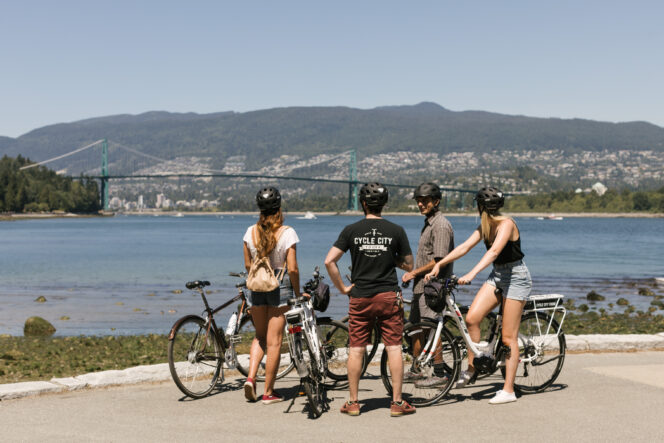
Cycle City Vancouver: Photo: Allison Kuhl
In addition to learning about environmental issues, there are a plethora of activities that you can enjoy in Vancouver that are eco-friendly. First of all, there are hikes and walks that you can take while admiring the city’s natural setting.
The city has many companies that rent bicycles as well as offer tours that will help you to get to know Vancouver in a green way. Cycle City Vancouver rents e-bikes and performance road bikes, as well as provides different tours, such as one around Stanley Park, another that goes all around the city (e.g., Chinatown, Gastown), and an Epic Electric Bike Tour.
For those who want to experience the peace of Vancouver’s local waters, there are numerous eco-marine paddle sports centres, including the Deep Cove Kayak Centre, Jericho Beach Kayak Centre, and Vancouver Water Adventures. Keep in mind that availability is seasonable. For example, Jericho Beach Kayak offers Winter Paddling Saturdays from 10am to noon from October to April, as well as group tours year-round. Starting in May, they rent a variety of kayaks and surf skis. Another great option is renting a canoe, kayak, or stand up paddleboard (available starting in the spring) with Takaya, operated by the Tsleil-Waututh Nation, in North Vancouver. They feature cultural canoe and split tours that combine paddling with the sharing of cultural and ecological knowledge.
Whale watching in Vancouver is also conservation-minded. Companies like Vancouver Whale Watch, Prince of Whales, and Wild Whales Vancouver take eco-tourism seriously, making sure to stay a safe and respectful distance from marine life, donating to conservation research, as well as providing information to guests about the local environment and its preservation.
You could also go on an eco-food tour to learn about local ingredients in Vancouver and how to harvest them ethically and sustainably. A Taste of Nature leads a tour that celebrates “Forest to Table Cuisine,” starting at Second Beach in Stanley Park with samplings of dishes such as wild mushrooms with sea asparagus on Yukon sourdough.
Alternatively, if you’re interested in getting to know Vancouver’s food systems, you can visit one of its farmers markets, which sells everything from sustainable seafood to fresh seasonal local produce. Or, you can visit one of the community gardens in the city. Walk, run, or bike along the Arbutus Greenway—reimagined land next to old railway lines from False Creek to the Fraser River. Along the way, you’ll find numerous community gardens, showcasing Vancouver’s passion for and commitment to eco-living.










